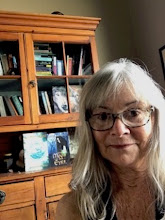1. Please tell us a bit about yourself. Are you a full-time writer? fiction or non-fiction?
~~I'm a full time writer in various genres. My novels are literary fiction, but I have had a horror novella published as well. I have had short stories in horror, romance, fantasy, inspirational and children's stories published in anthologies and magazines.
~"Full time" for me really means "Going all the time," as I have small kids and a job at a newspaper. I own part of a small publishing company as well, where we put out a quarterly literary journal, do presentations at schools and organizations, and attend conferences. The diversification is what makes it possible, I think, for me to be successful. all the other work contributes to making my full length books better.
2. What has been your experience in the traditional publishing world?
~~I was able to interest a well-known powerful agent at a writer's conference. Unfortunately, it didn't work out; she moved houses after a year and no longer represented my genre. It was my first book, so I was floundering, took it personally, and had all those "I'm not worthy" writerly thoughts.
~After a couple of days I brainstormed different ways to get my novel, "Learning Life Again", out to the public. (Available anywhere books are sold or www.amazon.com or www.barnesandnoble.com) The difficulty I had was its genre--Literary fiction can be a vague thing to sell, and my particular book is about two women with brain injury--not exactly garden variety stuff. However, I researched small presses, and the first small press I queried said yes.
~I have since had many short stories published in the traditional sense, and am finishing my second lit. fiction novel, which I will shop in the traditional sense.
3. When you decided to go a different route, was information easy to find? Was it confusing?
~~My first reference was the Writer's Market website by Writer's Digest (www.writersmarket.com) I was able to find regional small presses, which I hoped would give me a fair shot, and go from there. I queried three or four west-coast presses. Between the website and other research, I was able to find a house that I thought was a good fit.
4. Tell us about the small press you selected. Was it what you expected? Difficult/easy? Would you follow the same route with other work?
~~I went with Wyatt-Mackenzie Publishing. It was confusing, mostly because of my own inexperience. They are primarily a non-fiction house, but I have a platform with brain injury that transcends the fiction/non-fiction barrier, since though fictional, my book is based on parts of my own experience as a person who has survived traumatic brain injury.
~It was hard, because I was unaware how much would be expected of me after the book came out--all the publicity. I wish that I had known a bit more about how to do that before I jumped in with both feet. I've done well, but I had to adjust my idea about being the next big thing. That was not necessarily a bad thing though. I think the experience made me more aware of the need to be absolutely specific about genre and the need to create a platform for any book I intend to sell, fiction or non-fiction.
5. Can you describe your marketing platform? Has this been successful in promoting your work?
~~My brain injury experience makes me marketable in a unique way. I am able to do inspirational talks at everywhere from elementary schools to libraries to hospitals to care centers, public organizations and colleges to writing groups. I've been able to tweak my message to suit any audience. Public speaking is what has helped get my book noticed. I get a lot of traffic to my website, www.jenniferchambers.com, and am able to personally sell books that way. I do many interviews on multiple media, including web and commercial radio, blogs, websites, and print media. That helps.
~This strikes me as funny, since I came from a place where, at 15, I had to re-learn everything from eating, speaking, to tying my shoes. It's a humbling experience to be in front of a large group of people to tell my story, and it seems to come across well.
6. what advice would you give other aspiring authors?
~~Be persistent! That is the one thing that has contributed to me realizing my dreams. If I can come from literal brain injury to publishing a book, anyone can, if they are willing to work hard and keep learning. The book business is morphing into something exciting and new. I've been able to harness that by going with it-I could not have been more surprised, or pleased, when my horror novella, "Listen to Gran" was e-published by Books To Go Now (www.bookstogonow.com )
~And that, I think, is the most important thing I think I've learned: I needed to adjust my idea of success. I've been able to accomplish so much since I gave up the idea that it had to be one strict rule to stardom. There's nothing wrong with being a steady working writer. I get to do what I love and have a family too. It's all gravy! Yeah, Steven King numbers might be in my future--nothing wrong with keeping the dream alive--but keeping at it is great too.

No comments:
Post a Comment